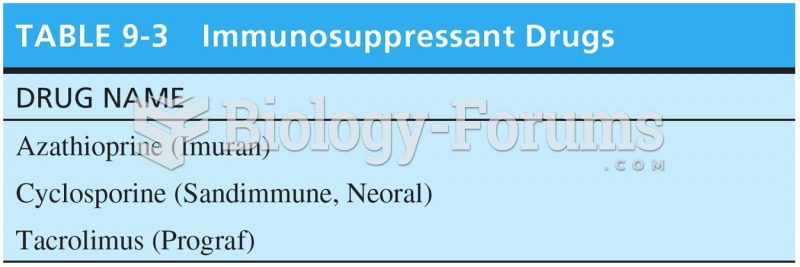Answer to Question 1
Correct Answer: 1,2
Rationale 1: Social isolation may occur because the client must avoid crowds and people who are ill or have been exposed to illness.
Rationale 2: Because the action of the medication is to suppress immune response, this client has a higher risk of infection.
Rationale 3: There is no evidence that immunosuppressive medications cause loss of appetite and decreased intake.
Rationale 4: Immunosuppressive therapy does not affect gas exchange.
Rationale 5: There is nothing in the scenario that supports the diagnosis of Caregiver Role Strain.
Global Rationale: Potential nursing diagnoses include Anxiety or Fear, Ineffective Family Therapeutic Regimen Management, Social Isolation, Deficient Knowledge (Drug Therapy), Risk for Infection, related to drug treatment, and Risk for Injury, related to adverse drug effects. There is no evidence that immunosuppressive medications cause loss of appetite and decreased intake. Immunosuppressive therapy does not affect gas exchange. There is nothing in the scenario that supports the diagnosis of Caregiver Role Strain.
Answer to Question 2
Correct Answer: 1,2,3
Rationale 1: Corticosteroid therapy can cause fluid retention, which would increase blood pressure.
Rationale 2: Obesity and fluid retention are adverse effects of long-term corticosteroid use.
Rationale 3: Long-term corticosteroid use may cause cataract formation.
Rationale 4: Long-term corticosteroid use is not associated with dysrhythmia.
Rationale 5: Long-term corticosteroid use is not associated with decreased peripheral circulation.
Global Rationale: The long-term adverse effects of corticosteroids are serious and include osteoporosis, cataract formation, mental status changes, fluid and salt retention, HTN, hyperglycemia, obesity, and adrenal atrophy. Dysrhythmia and changes in peripheral circulation are not associated with corticosteroid use.







